Mike Sweetman
Not sure where to start with your new water filter purchase? The following is a guide to help you better understand what’s important in order to find the right caravan water filter for you.
Clean drinking water. It’s as essential as clean undies for your next camping, caravan or RV trip, but what do you need and how does it all work?
Read on and I’ll explain.
When it comes to choosing a water filter system in Australia there are several questions to first ask yourself:
- What quality of water you expect to be filling up with?
If you think you need to be filling up in remote locations or from bore or creek water, you’ll need a more capable system than just filling up at home for a week at the beach. - How often will you be travelling?
Do you only use your van once a year or are you full-time travelling? - Where will it be installed?
Do you have space to install water filtration under sink or elsewhere in your van? - What level of filtration is required?
Do you want to improve taste, remove sediment or kill bacteria.
Couldn’t be f’ed reading about filters and just want to find out what you need?
Jump to the water filter reviews.
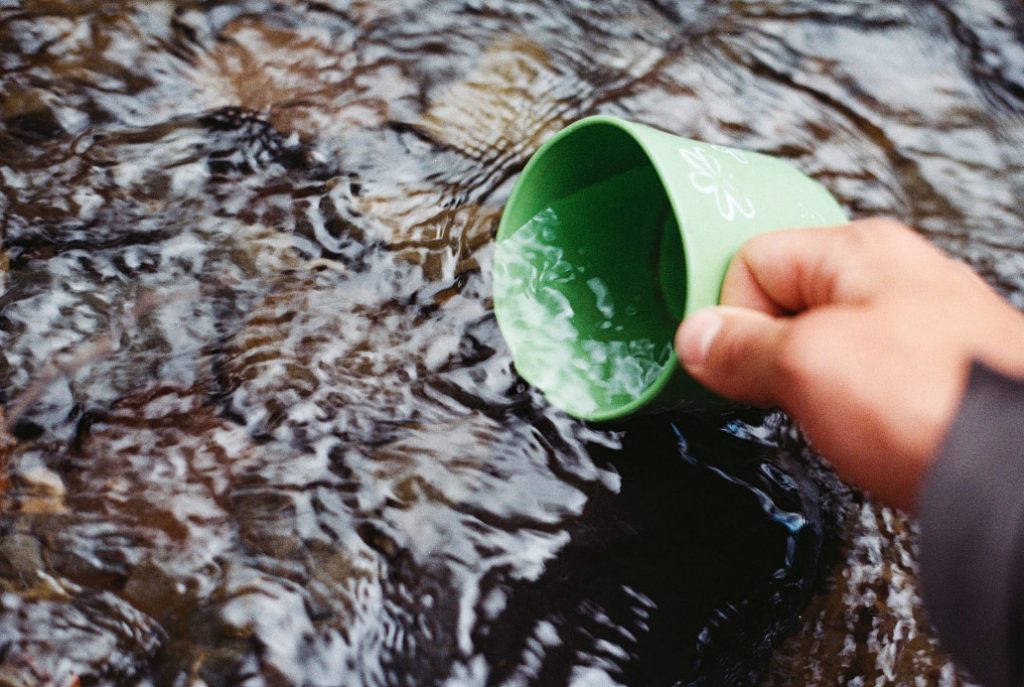
Do I need a water filter for my caravan?
It only takes one tank of dodgy water to realise why caravan water filters are so important. I bought my first water filter within a week of setting off on our 3 month adventure after we filled up on bore water at Deepwater Nation Park. Everyone (my wife and kids) complained that the water tasted yuck.
But taste is only part of the equation. You want to know your water is safe to drink. Even filling up on town water, there is still a risk that your tanks are harbouring some nasty bacteria, let alone filling up in remote areas in Australia. Properly sanitised drinking water is pretty key to a good trip!
- Bore water is prevalent across rural and remote Australia (including caravan parks) and while much of the water is safe for consumption, it can be contaminated.
- You want your water to be safe to drink, free from bacteria and viruses
- You want your water to taste and smell good
- Cheap insurance for appliances like washing machines, pumps, coffee machines etc. They like filtered water as much as you - highly mineralised water can cause problems.
Water Filter Overview
There are a range of different types of filters available for caravans and camping setups, each with their different pros & cons. We have outlined the most common below.
Water filters are a bit like lego – they come in standard sizes and you can pick and choose the right one for your application, or combine multiple together to create a filtration system that suits your needs.
Sediment Filters
Yep, you guessed it –they filter out sediment. No matter where you take your water from there will be suspended solids in the water. Things like dirt, sand, rust, scale and other organic and inorganic matter that you don’t want to be drinking.
The image to the right shows a 5 micron spun polyester water filter before and after use on Brisbane town water. The used filter was in service for about 6 months. A good reminder that water that looks clean can actually still be quite dirty!
Depending on where you plan to source your water from will determine the level of sediment filtration required. Just want to fill up on town water? Sediment filtration won’t be as critical (but is definitely still beneficial). Filling up from a bore or creek however may require multi-stage sediment filtration. 5 Micron is the minimum required for UV filtration (which we’ll cover below) and is what we would recommend in general. Higher levels of sediment filtration (i.e. lower than 5 micron) will require more frequent filter changes and may not be required depending on your water source.
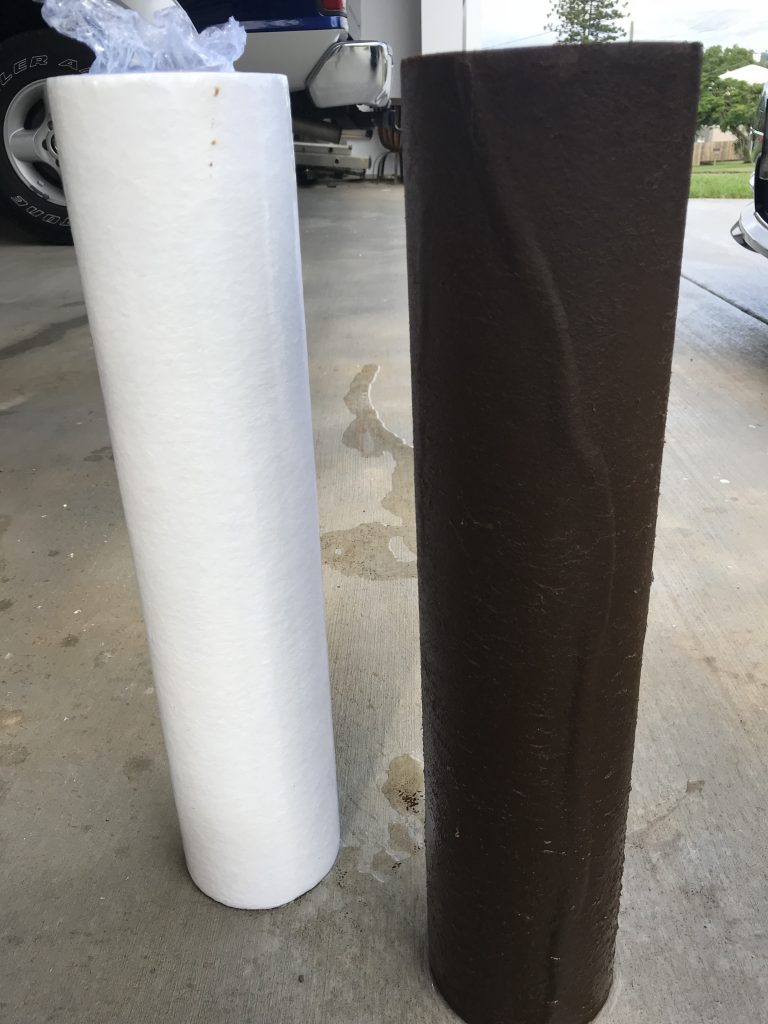
The two primary types of sediment filters for mobile application are depth filters (made from spun polypropylene, cellulose or polyester) and pleated filters (typically made from polyester). Pleated filters have the advantage of being reusable, meaning if you’re on the road you can clean them out if they get blocked.
Sediment filters are the first line of defense in any good water filtration system and should be installed before any carbon, UV or reverse osmosis filtration
| Advantages | Disadvantages |
|
Carbon Filters
Activated carbon filters remove odours and improve the taste of your water whilst also providing advanced sediment reduction. They can remove hundreds of contaminants and chemicals including chlorine, chloramine, pesticides and herbicides.
Carbon filters typically range between 0.5-5 micron. We’d typically recommend 1 micron or finer for carbon block filters.
While carbon filters are great at improving the taste of your water, they do have a very important limitation – they can’t filter out viruses, bacteria or cysts on their own. Think giardia, e-coli and roto virus. In fact, carbon filters can actually harbour bacteria because of their porous nature. This means that on their own, they aren’t suitable for use on unsanitised water sources (bore/creek etc).
The majority of caravan inline water filters are carbon filters.
| Advantages | Disadvantages |
|
|
Silver Carbon Filters (Bacteriostatic)
Silver is seriously good at killing bacteria, so good in fact that NASA use it to treat water for Astronauts. By incorporating silver into carbon block filters, you can knock those nasty bacteria on the head. Silver carbon filters are a great solution where your source water is has not been sanitised i.e. bore water, tank water or creek water. Bacteria can also grow inside your Caravan or camper water tank, so even if you’re confident of the water your putting into your tanks, they may still be useful.
Also worth noting that Silver won’t knock out viruses, unlike UV systems-so whilst they are good, they are not the final word in water sanitisation.
Just make your silver carbon filter is actually bacteriostatic, (which means that it will kill bactiera) – some silver carbon filters are not actually bacteriostatic and we would recommend avoiding these.
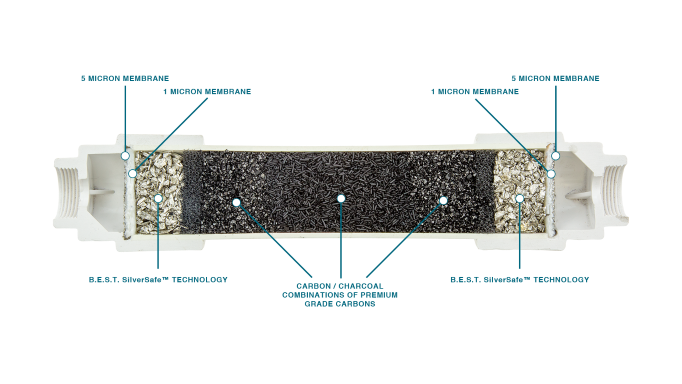
| Advantages | Disadvantages |
|
|
Ceramic Filters
Sediment and Bacteria Removal
Ceramic filters are very fine (sub 1 micron typically) filters that remove sediment, bacteria and cysts (E coli, Giardia etc). They are also washable, which can extend their usable life. Ceramic filters are great to combine with a carbon filter, as ceramic filters won’t remove chemicals like Chlorine. Ceramic filters also won’t remove viruses.
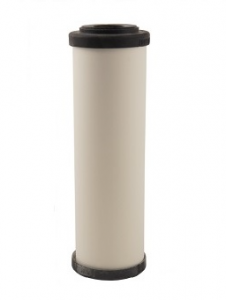
| Advantages | Disadvantages |
|
|
Ultra Violet (UV) Water Sanitisers
Catch you later Bacteria and Viruses!
While silver carbon filters and ceramic filters can remove bacteria, they can’t effectively remove viruses. Ultra Violet or ‘UV-C’ filters remove bacteria, cysts and viruses – they are the ultimate water sanitiser. But you normally wouldn’t hear much about UV filters in the caravan and camping scene.
UV-C filters typically require big bulky Mercury based lamps which were not much chop in caravan, camping or RV setups. They consumed a lot of power, are required to be ‘on’ constantly, the bulbs needed replacing every 6-12 months (resulting in high cost of ownership)and they don’t like vibration.
The recent advent of LED based UV water sanitisers is set to shake things up and make UV a reality caravans. They fix just every shortcoming of mercury based lamps by having very low power consumption (<10W), they are ‘instant on’ meaning they only operate when you use water, plus they have extremely long service life (5000hrs+). I’m prone to hyperbole, but they are the Tesla of the water filter world and they are perfect for caravan, RV and camping applications. Best of all they are small and compact to boot!
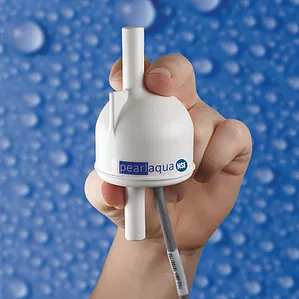
Reverse Osmosis
Reverse Osmosis (RO) water filters are regularly used for domestic and commercial applications, but they are not well suited to use in caravan and camping setups due to the shear amount of water they waste. For every 5 litres of water you feed into an RO filter, you get 4 litres of waste water (brine) and 1 litre of filtered water – roughly 70-80% of water is wasted!
You also require high pressure pumps to make the RO work properly. To make matters worse, on the outlet of the filter you only get very low pressure and flow meaning that you need to store the water back in a tank rather than use it directly.
Unless you’re planning on drinking your own pee, I don’t think there is any reason to consider Reverse Ozmosis for caravan and camping.
Which Water Filter System is right for me?
Now that you have the understand the basics, we can look at which water filtration setup is best for your caravan and camping needs.
The Weekend Warrior
If you only go camping for a couple of weeks a year or less and don’t plan on filling up with anything other than town water, we’d recommend an inline water filter as your first port of call. These are typically carbon or silver carbon filters, so they will filter out sediment and improve taste and smell to some degree. A bacteriostatic silver carbon filter will also remove bacteria.
Inline filters are run on the end of your hose line when you fill up your tanks as a pre-filter, so they are very simple to use.
The downside is that the filter won’t perform at its best when used at high flow rates, so keep this in mind when filling up.
Advantages
- Cheap
- Very easy use – just clip onto hose.
- Will improve taste and odour to some degree
DISADVANTAGES
- Will clog quickly
- Won’t sanitise your water from potential bacteria or viruses (depending on what type you buy)
- High flow rates (i.e. when filling up tanks) will reduce performance
- Won't reduce dissolved minerals from bore water
The "Serious Camper"
If you serious about caravanning and camping and go regularly and want a better quality system that is more capable that a standard inline filter.
What you need
Pre-tank filter – We’d recommend a proper sediment filter – for example the Bore Water and Sediment Filter from Thirsty Nomad. This will mean that your appliances will benefit from softened water.
Undersink Filter – Installing an undersink filter at the point of use will dramatically improve the taste of the water you are drinking. We’d recommend a bacteriostatic carbon filter, or a twin cartridge system with a dedicated sediment and bacteriostatic carbon filter.
Advantages
- High quality of water from town or bore
- Will improve taste and odour
DISADVANTAGES
- More expensive initially
- More time consuming to install
The "Full-time Nomad"
TBC
Advantages
- Stacks of flexibility to add different filter cartridges
- High quality of water from
- Will improve taste and odour to some degree
DISADVANTAGES
- More expensive initially
- More time consuming to install
Frequently Asked Questions
Q. How often should you change the water filter on a caravan?
Its good practice to change your water filters every 6-12 months, but it really depends on usage, the type of water you are filtering and the water filtration setup you have.
Q. Which filter is better for a caravan 5 micron or 10micron
We’d recommend 5 micron sediment filters, as these will work best with carbon filters and UV or RO systems.
Q. How do you clean a caravan water filter
Inline water filters can be connected in reverse to flush out the dirty water. See demonstration video here.
Q. Do all caravans have water filters?
No – caravans don’t usually come with a water filter. That’s why its so important to invest in a water filtration system to suit your caravan and camping needs.
Q. Do under sink water filters work?
Under sink water filters are an excellent option to filter the incoming water in your caravan or RV. See Which Water Filter System is right for me?
Q. How do you install a water filter on a caravan?
Check out this video on Youtube
Q. How long do caravan water filters last?
How long is a piece of string? Depends on how much water you’re using and what the quality of water your filtering. Best to follow the manufacturers recommendations.